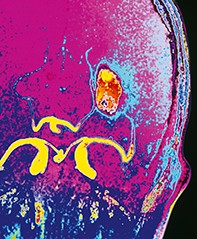Transient neurological troubles in patients with type 2 diabetes
Transient neurological attacks are warning signs that patients may have cerebrovascular disease. Although coronary heart disease is the most common cause of morbidity, disability and mortality in people with type 2 diabetes, transient ischaemic attacks (TIAs) and strokes are frequent cerebrovascular complications in such patients, particularly as they age. Type 2 diabetes is an important risk factor for TIA and/or stroke, especially in patients who have other components of the type 2 syndrome (hypertension, dyslipidaemia, prothrombosis).
Many people have a great fear of having a stroke and see it as something that may strike them down without warning, that they cannot prevent and from which they may have full functional recovery, die or be left with a crippling disability. These people have good reason to fear a stroke more than a heart attack: 20% of those with a stroke die within a month and one-third of the survivors are disabled permanently.

